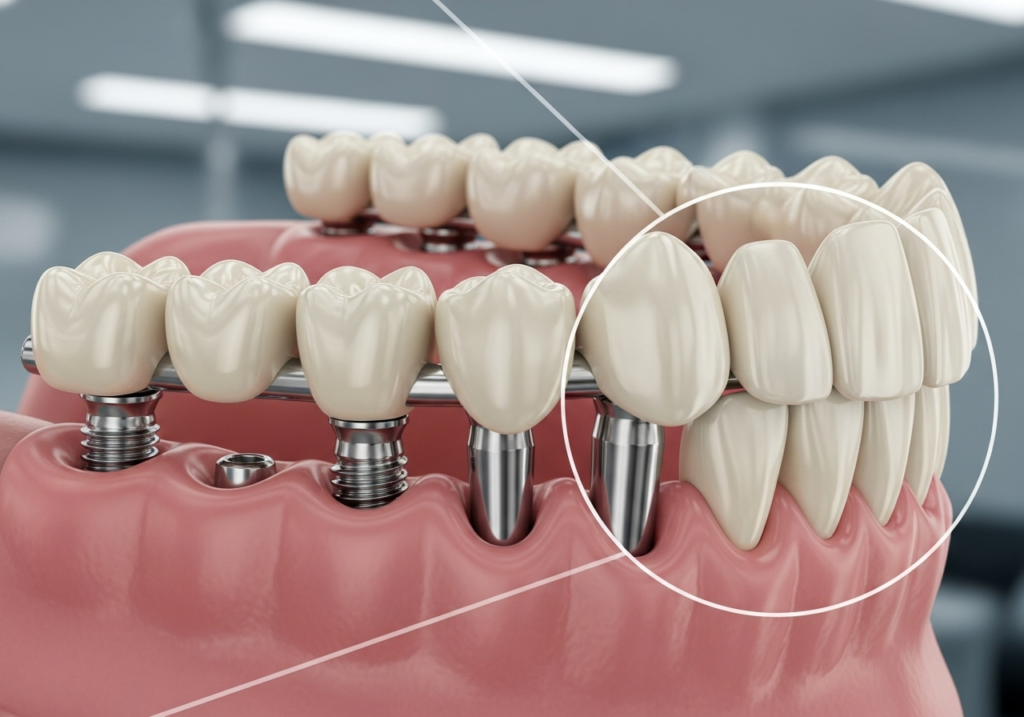Losing multiple teeth can affect your confidence, oral health, and overall quality of life. Full mouth dental implants are a modern solution designed to restore both the function and appearance of your teeth. Unlike traditional dentures, full mouth implants provide a permanent, stable, and natural-looking replacement for an entire set of teeth. In this article, we’ll explain what full mouth dental implants are, their costs, the process, and the benefits you can expect.
What Are Full Mouth Dental Implants?
Full mouth dental implants involve replacing all the teeth in the upper jaw, lower jaw, or both with a set of permanent artificial teeth anchored to the jawbone. These implants act like natural teeth, providing strength, stability, and improved chewing function.
Unlike dentures, which can slip or cause discomfort, full mouth implants are surgically placed into the jawbone, where they fuse with the bone through a process called osseointegration. This creates a strong foundation for a fixed prosthetic that looks and functions like real teeth.
Who Can Benefit from Full Mouth Dental Implants?
Full mouth implants are ideal for individuals who:
- Have lost most or all of their teeth due to decay, injury, or gum disease
- Are dissatisfied with removable dentures due to discomfort or poor fit
- Have sufficient jawbone density to support implants (or are willing to undergo bone grafting if necessary)
- Want a permanent, natural-looking solution to restore their smile and oral function
Your dentist or oral surgeon will conduct a thorough evaluation, including X-rays and 3D imaging, to determine if you are a suitable candidate.
The Full Mouth Dental Implant Process
The process of getting full mouth dental implants typically involves several stages, each critical for long-term success:
1. Initial Consultation and Planning
During your first visit, your dentist will assess your oral health, discuss your goals, and create a customized treatment plan. This may include digital imaging, impressions, and a review of medical history.
2. Tooth Extraction (if needed)
If you have damaged or decayed teeth remaining, they will need to be removed. Sometimes, extractions and implant placement can occur during the same visit, depending on your case.
3. Bone Grafting (if needed)
If your jawbone has weakened due to tooth loss, a bone graft may be performed to provide a stable foundation for the implants. Healing from grafting can take several months.
4. Implant Placement
Titanium implants are surgically inserted into the jawbone. These implants act as artificial tooth roots and typically require a few months to integrate with the bone through osseointegration.
5. Abutment Placement
Once the implants have fused with the bone, abutments are attached. These connectors hold the final prosthetic teeth securely in place.
6. Placement of Prosthetic Teeth
Custom-made crowns, bridges, or dentures are attached to the abutments, completing the restoration. The result is a fully functional, natural-looking set of teeth.
Cost of Full Mouth Dental Implants
The cost of full mouth dental implants varies depending on factors such as location, materials used, the number of implants required, and any additional procedures like bone grafting. On average, full mouth dental implants can range from $20,000 to $50,000 or more per arch.
While the upfront cost is higher than traditional dentures, implants are a long-term investment that can last decades with proper care, potentially saving money on repairs and replacements over time.
Benefits of Full Mouth Dental Implants
Full mouth dental implants offer numerous advantages over traditional dentures or partial replacements:
- Natural Appearance: Custom prosthetics are designed to look and feel like real teeth.
- Enhanced Function: Implants restore chewing ability, allowing you to eat comfortably without restrictions.
- Bone Preservation: Implants stimulate the jawbone, preventing bone loss that often occurs with missing teeth.
- Stability and Comfort: Unlike removable dentures, implants do not slip or cause sores.
- Long-Term Durability: With proper care, implants can last 15–25 years or even a lifetime.
- Improved Confidence: A full set of natural-looking teeth can boost self-esteem and social interactions.
Recovery and Maintenance
Recovery from full mouth dental implants varies depending on individual factors and whether additional procedures like bone grafting were needed. Most patients experience mild discomfort, swelling, and bruising, which can be managed with pain medication and proper care.
Maintaining your implants requires:
- Brushing and flossing daily
- Regular dental checkups
- Avoiding hard foods that could damage the prosthetic
- Quitting smoking, which can affect healing and implant longevity
Conclusion
Full mouth dental implants are a transformative solution for individuals with significant tooth loss. While the process requires time, planning, and investment, the long-term benefits—including natural appearance, improved function, and enhanced confidence—make it a worthwhile option. If you’re considering full mouth dental implants, consult with a qualified dentist or oral surgeon to explore your options and create a personalized treatment plan. With the right care, implants can restore not just your smile, but your quality of life.

